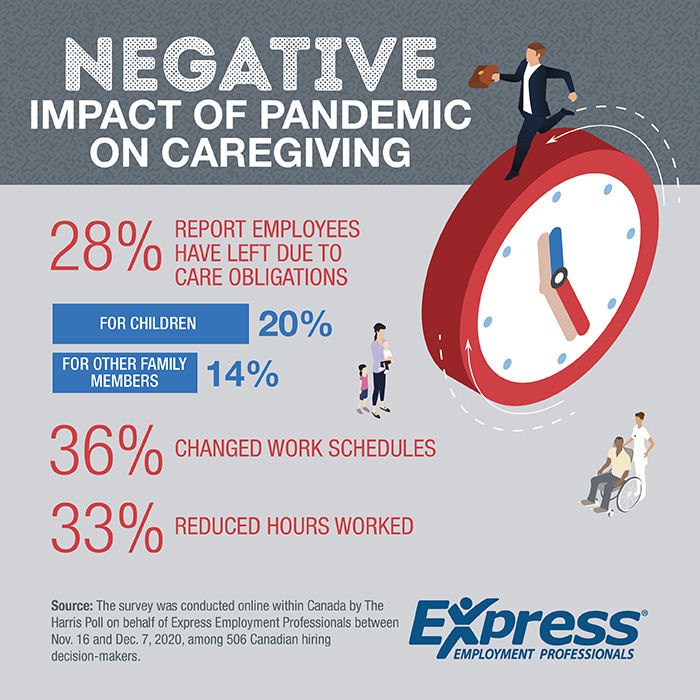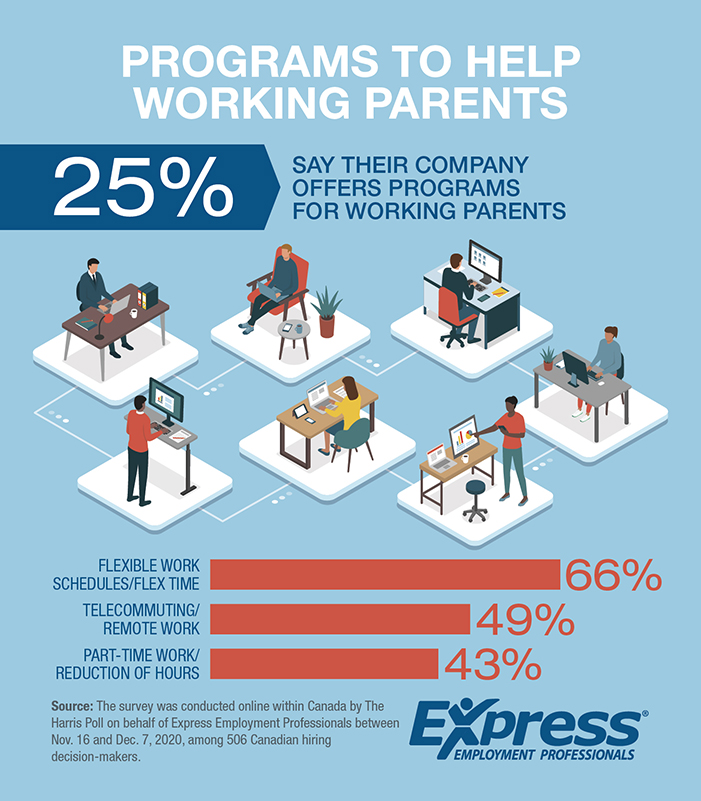Survey: Employees Want Help Balancing Caregiving Responsibilities, But Companies Say They Don’t Have the Resources
May 11, 2021

Survey: Employees Want Help Balancing Caregiving Responsibilities, But Companies Say They Don't Have the Resources
Only 30% Say Retaining Working Parents is Company Priority
There is a significant disconnect between what employees say they need to balance work and caregiving responsibilities, and what employers are offering, according to a new survey by Harris Poll, commissioned by Express Employment Professionals.
According to the results, 1 in 4 companies (28%) report employees left due to care obligations last year (hyperlink to previous news release), either for children (20%) or other relatives (14%).
A substantial portion of those surveyed also say that employees who have remained have changed their work schedule (36%) and/or reduced the number of hours they work (33%) due to family obligations.
While most of the hiring decision-makers surveyed (84%) believe their company is doing just the right amount to help employees, more than half (57%) say their employees have expressed an interest in having services to help balance caregiving responsibilities.

Moreover, less than a quarter (23%) of those surveyed say one of their company's most important priorities right now is updating programs to accommodate employees who are caregivers, and only 31% say their company being more flexible in accommodating employees' schedules will be a permanent transformation as a result of the COVID-19 pandemic.
When it comes to working parents specifically, nearly 3 in 4 hiring decision-makers (73%) agree that it is important to their company to nurture and grow working parent leaders within their organization. Yet, only 22% say retaining working parents is one of the most important priorities for their company right now, and only 1 in 4 (25%) say their company offers programs to help employees who are parents stay in the workplace.

The most common programs are flexible work schedules/flex-time (66%), telecommuting/remote work (49%) and/or reduction in hours/moving to part-time (43%). Another 26% say their company does not currently offer any programs but is considering doing so.
However, the plurality of companies (40%) do not offer any programs and are not planning to introduce any in the future.
The majority of those surveyed (63%) say a lack of resources is the reason their workplace does not offer more accommodations for employees with caregiving obligations.
However, 74% of those surveyed believe federal programs and initiatives supporting working parents (e.g., extended paid leave, universal childcare) would be beneficial in helping working parents remain in the workforce.
Brent Pollington, an Express franchise owner in Vancouver, British Columbia, reports employees in his area have left jobs due to caregiving responsibilities during the pandemic, especially where virtual work is not feasible. But he says most businesses cannot afford new programs right now.
"Businesses have been severely impacted by the pandemic with most companies in triage right now just trying to stop the bleeding," said Pollington. "Businesses are trying to stay afloat and in order to keep their staff employed, they cannot afford any further accommodation of their employees."
Jessica Culo, an Express franchise owner in Edmonton, Alberta, sees the same trend of employees leaving due to caregiving responsibilities, even when remote work is available. She agrees that most companies are in "survival mode" and cannot afford new accommodations right now but says employers have provided more flexibility to employees to help them balance their work/life responsibilities.
"For the most part, we have seen nothing but support and encouragement for working parents," said Culo. "I think flexibility offered by employers is at an all-time high and this must be continued in order to retain working parents."
Culo is implementing a hybrid in-office/remote model for her employees, something she says more companies in her area are also introducing.
"We are looking at a 20-40-60 model in which employees that have been with the company for at least one year and are meeting performance expectations are able to opt-in to a hybrid model that allows them to work either 20%, 40% or 60% of their week (1, 2 or 3 days) remotely," she said. "This would be scheduled with the same days being worked remotely each week for planning purposes, both professionally and personally."
Pollington also reports a significant increase in the flexibility being offered to employees during the pandemic. He says some businesses even allow working parents to bring their kids into work on days when they do not have other childcare options.
"The caveat is that it doesn't impact your or others' ability to complete work and meet deadlines," he said.
There is no doubt the last year has been especially challenging for caregivers, Express CEO Bill Stoller said.
"Those companies who figured out how to accommodate for this workforce segment, however, helped continue to put food on the table for families and staff essential businesses to keep the economy going," he said. "Support should continue well beyond the pandemic for caregivers to get the labor force back to full strength and health."
Survey Methodology
The survey was conducted online within Canada by The Harris Poll on behalf of Express Employment Professionals between Nov. 16 and Dec. 7, 2020, among 506 Canadian hiring decision-makers (defined as adults ages 18+ in Canada who are employed full-time or self-employed, work at companies with more than one employee, and have full/significant involvement in hiring decisions at their company). Data was weighted where necessary by company size to bring them into line with their actual proportions in the population.
###
If you would like to arrange for an interview to discuss this topic, please contact Ana Curic at (613) 858-2622 or email
ana@mapleleafstrategies.com.
About Bill Stoller
William H. "Bill" Stoller is chairman and chief executive officer of Express Employment Professionals. Headquartered in Oklahoma City, Oklahoma, the international staffing company has more than 830 franchises in the U.S., Canada, South Africa, Australia and New Zealand. Since inception, Express has put more than 9 million people to work worldwide.
About Express Employment Professionals
At Express Employment Professionals, we're in the business of people. From job seekers to client companies, Express helps people thrive and businesses grow. Our international network of franchises offers localized staffing solutions to the communities they serve across the U.S., Canada, South Africa, Australia and New Zealand, employing 526,000 people globally in 2020. For more information, visit
www.ExpressPros.com.